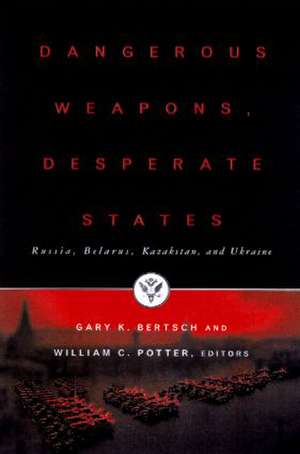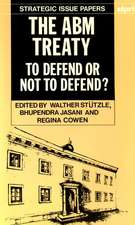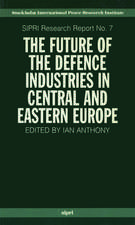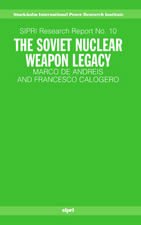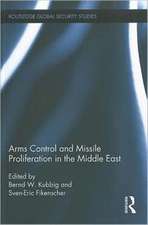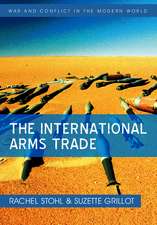Dangerous Weapons, Desperate States: Russia, Belarus, Kazakstan and Ukraine
Editat de Gary K. Bertsch, William C. Potteren Limba Engleză Paperback – 24 iun 1999
| Toate formatele și edițiile | Preț | Express |
|---|---|---|
| Paperback (1) | 420.34 lei 6-8 săpt. | |
| Taylor & Francis – 24 iun 1999 | 420.34 lei 6-8 săpt. | |
| Hardback (1) | 1063.31 lei 6-8 săpt. | |
| Taylor & Francis – 24 iun 1999 | 1063.31 lei 6-8 săpt. |
Preț: 420.34 lei
Nou
Puncte Express: 631
Preț estimativ în valută:
80.43€ • 84.20$ • 66.55£
80.43€ • 84.20$ • 66.55£
Carte tipărită la comandă
Livrare economică 05-19 aprilie
Preluare comenzi: 021 569.72.76
Specificații
ISBN-13: 9780415922371
ISBN-10: 0415922372
Pagini: 296
Dimensiuni: 152 x 229 x 23 mm
Greutate: 0.55 kg
Ediția:New.
Editura: Taylor & Francis
Colecția Routledge
Locul publicării:Oxford, United Kingdom
ISBN-10: 0415922372
Pagini: 296
Dimensiuni: 152 x 229 x 23 mm
Greutate: 0.55 kg
Ediția:New.
Editura: Taylor & Francis
Colecția Routledge
Locul publicării:Oxford, United Kingdom
Recenzii
"Few problems raised by the new states of the former Soviet Union worry the outside world more than the seepage of nuclear and conventional arms and their ingredients into the wrong hands. Until now, however, we have not had an in-depth understanding of the policies and institutions governing the Russian, Ukranian, Belarusian and Kazakh control over critical exports. Written by an international group of highly expert authors, this is the first book to tackle the four key countries in great, yet accessible, detail. Dangerous Weapons, Desperate States is a crucial tool for addressing this crucial problem." -- Robert Legvold, Professor of Political Science, Columbia University
"Dangerous Weapons, Desperate States illuminates the economic roots of proliferation in the NIS and the domestic and international ineffectiveness that has failed to prevent its growth. The question remains whether the examples of export control failure and consequences of continued inaction outlined in this book will serve as a wake-up call for political leaders in the East and West." -- Kenneth N. Luongo, Executive Director, Russian American Nuclear Security Advisory Council
"Dangerous Weapons, Desperate States is the most comprehensive review of export control development in the former Soviet Union." -- Henry Sokolski, Executive Director, Nonproliferation Education Policy Center
"It is to the credit of the editors and the contributors that they do not dwell on nuclear issues at the expense of other threats...The authors get to the 'nuts and bolts' of export control...Recommended for research libraries." -- Choice
"This edited volume makes at least two valuable contributions to understanding non-proliferation and export control in the former Soviet region...It is a useful book for students of security affairs, foreign policy analysis and international regimes." -- Benjamin E. Goldsmith The Canadian Journal of Political Science
"Dangerous Weapons, Desperate States illuminates the economic roots of proliferation in the NIS and the domestic and international ineffectiveness that has failed to prevent its growth. The question remains whether the examples of export control failure and consequences of continued inaction outlined in this book will serve as a wake-up call for political leaders in the East and West." -- Kenneth N. Luongo, Executive Director, Russian American Nuclear Security Advisory Council
"Dangerous Weapons, Desperate States is the most comprehensive review of export control development in the former Soviet Union." -- Henry Sokolski, Executive Director, Nonproliferation Education Policy Center
"It is to the credit of the editors and the contributors that they do not dwell on nuclear issues at the expense of other threats...The authors get to the 'nuts and bolts' of export control...Recommended for research libraries." -- Choice
"This edited volume makes at least two valuable contributions to understanding non-proliferation and export control in the former Soviet region...It is a useful book for students of security affairs, foreign policy analysis and international regimes." -- Benjamin E. Goldsmith The Canadian Journal of Political Science
Notă biografică
Gary Bertsch is the University Professor of Political Science and Director of the Center for International Trade and Security at the University of Georgia. He is co-author of Arms on the Market: Reducing the Risk of Proliferation in the Former Soviet Union (Routledge, 1998), U.S. and Japanese Nonproliferation Export Controls (1996) and International Cooperation on Nonproliferation Export Controls (1994). William Potter is Professor and Director of the Center for Nonproliferation Studies at the Monterey Institute of International Studies and Director of the Center for Russian and Eurasian Studies.
Cuprins
Part 1 PART I EXPORT CONTROLS, TRADE, AND SECURITY; Chapter 1 INTRODUCTION: THE CHALLENGE OF NIS EXPORT CONTROL DEVELOPMENT, Gary K.Bertsch, William C.Potter; Chapter 2 NIS SECURIT AND NONPROLIFERATION EXPORT CONTROLS, VyachaslauPaznyak, AnatoliRozanov; Part 2 PART II EXPORT CONTROL DEVELOPMENT IN THE NEW INDEPENDENT STATES; Chapter 3 NUCLEAR EXPORT CONTROLS IN RUSSIA: THE PLAYERS AND THE PROCESS, ElinaKirichenko, William C.Potter; Chapter 4 EXPORT CONTROL DEVELOPMENTS IN UKRAINE, VictorZaborksy; Chapter 5 THE BELARUSIAN EXPORT CONTROL SYSTEM, UralLatypov; Chapter 6 EXPORT CONTROLS IN THE REPUBLIC OF KAZAKSTAN, DastanEleukenov, Keith D.Wolfe; Part 3 PART III PROBLEMS AND PROSPECTS OF EXPORT CONTROL AND CURBING THE SPREAD OF WEAPONS; Chapter 7 CHEMICAL AND BIOLOGICAL WEAPONS EXPORT CONTROLS, MariaKatsva, DerekAverre; Chapter 8 THE POLITICS AND ECONOMICS OF RUSSIA'S CONVENTIONAL ARMS TRANSFERS, IgorKhripunov; Chapter 9 EXPORT CONTROLS AND NUCLEAR SMUGGLING IN RUSSIA, Vladimir A.Orlov; Chapter 10 RUSSIA AND THE MISSILE TECHNOLOGY CONTROL REGIME, AlexanderPikayev; Chapter 11 RUSSIA AND THE WASSENAAR ARRANGEMENT: A NEW MULTILATERAL EXPORT CONTROL REGIME FOR CONVENTIONAL WEAPONS AND DUAL-USE ITEMS, Elina Kirichenko, Dmitriy Nikonov; Part 4 PART IV CONCLUSION; Chapter 12 CONCLUSION, Gary K. Bertsch, William C. Potter; Part 5 PART V APPENDICES; APPENDIX 1 PROLIFERATION CONCERNS; APPENDIX 2 EXPORT CONTROL DEVELOPMENTS IN RUSSIA, UKRAINE, BELARUS, AND KAZAKSTAN; contry CONTRIBUTORS; INDEX;
Descriere
With the collapse of the USSR, fifteen fledgling sates inherited a massive Soviet arsenal, unstable political systems, and desperate economies. A "sell everything" mentality threatens to result in the largest arms bazaar in human history, and this potential "fire sale" includes weapons of mass destruction. This book addresses the challenges the new independent states (NIS) of the former Soviet Union (FSU) face in controlling and monitoring their sensitive, military-related exports.Dangerous Weapons, Desperate States explores the various theoretical approaches that help explain the development of nonproliferation export control systems in the NIS. The contributors, coming from both the FSU states and the US, provide a broad range of perspectives on the problems posed by the threat of proliferation.
